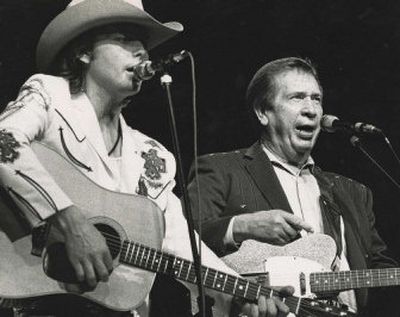Country music legend Buck Owens, 76, dies

Buck Owens, one of country music’s leading stars and a host of the long-running television variety show “Hee Haw,” died Saturday at his home in Bakersfield, Calif. He was 76.
He died in his sleep, and the cause was not immediately known.
By blending rock-and-roll rhythms with country harmonies, Owens created the distinctive “Bakersfield sound,” which propelled him to enormous success. Between 1959 and 1974, he had 45 songs in the country Top 10 and 20 No. 1 hits, including “Act Naturally” (1963), “Love’s Gonna Live Here” (1963), “Together Again” (1964), “I’ve Got a Tiger by the Tail” (1964) and “Waitin’ in Your Welfare Line” (1966).
He was unquestionably the leading country music star of the 1960s, annually selling more than 1 million records.
From 1969 to 1986, Owens and Roy Clark were the hosts of “Hee Haw,” a comedy and country music program that was hugely popular in rural America.
Except for his weekly “Hee Haw” appearances, Owens stopped performing in 1979 to focus on his varied business enterprises, which were concentrated in Bakersfield and Arizona, the state where he spent an impoverished childhood.
His career had a late resurgence after a Bakersfield country star of a younger generation, Dwight Yoakam, walked into Owens’s office on Sept. 23, 1987, and asked him to join him onstage that night at a county fair. The response was enthusiastic, and he collaborated with Yoakam the following year on “Streets of Bakersfield,” which became Owens’s 21st No. 1 hit.
He recorded several new albums, his earlier works were reissued and he found fresh acclaim as an elder statesman who refused to compromise the rough-hewn roadhouse feel of his music.
Alvis Edgar Owens Jr. was born Aug. 12, 1929, in Sherman, Texas, where his father was a sharecropper. To escape the Dust Bowl, 10 family members piled into a Ford sedan in 1937 and headed west, stopping in Mesa, Ariz., where their car broke down.
Owens quit school at 13 to work in cotton and potato fields and later was a truck driver and ditch digger.
“That was where my dream began to take hold,” he said, “of not having to pick cotton and potatoes and not having to be uncomfortable, too hot or too cold.”
He learned to play the mandolin and quickly moved on to the guitar and other instruments.
In 1951, he moved to Bakersfield after hearing that the oil-rich city held opportunities for musicians.
He worked nights at a Bakersfield club called the Blackboard and commuted during the day to studios in Los Angeles, where he was a backup musician for Tennessee Ernie Ford, Kay Starr, Gene Vincent, Wanda Jackson, Faron Young and other performers.
After signing a contract with Capitol Records in 1957, Owens formed a band, the Buckaroos, named by a fellow Bakersfield singer and musician, Merle Haggard. From 1958 to 1960, Owens lived in Puyallup, Wash., where he had a radio show and played in clubs.
Disdaining the packaged, syrupy sound associated with Nashville, Owens recorded his music in California, layering it with jangling guitars, driving drums, pedal steel guitar and tight vocal harmonies designed to sound good on radio.